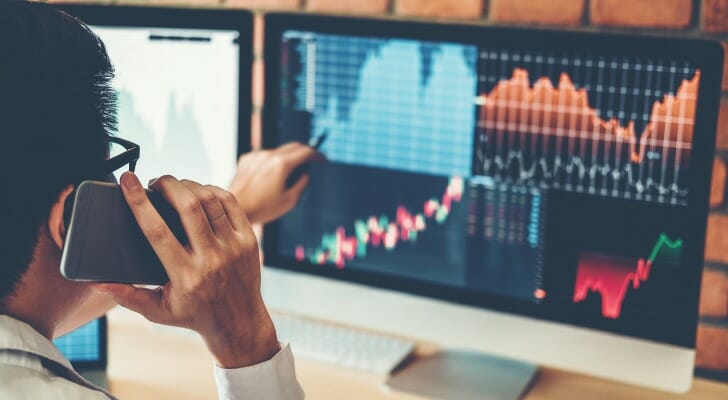If you’re an investor who is otherwise familiar with trading strategies involving futures and options, you may have wondered whether futures trading applies to cryptocurrency too. The good news is that Bitcoin futures contracts are indeed available for investors, allowing them to speculate on and take advantage of the currency’s future price.
Before investing in Bitcoin futures, ask a financial advisor about the risks involved for your portfolio.
Whether or not you’re new to investing in more traditional forms or in cryptocurrency, you may benefit from some expert professional help. Consider speaking to a financial advisor to better understand how to move forward with an investing strategy.
What Are Bitcoin Futures?
A futures contract is an agreement to buy or sell something at a future date for an agreed-upon price. Bitcoin future contracts have become relatively popular in recent years, but managing futures is them can be tricky because Bitcoin itself is a very volatile currency.
Bitcoin futures, therefore, allow investors to speculate on Bitcoin’s future price. Furthermore, investors can effectively deal Bitcoin without holding the currency in the present moment. The idea of trading Bitcoin is to have the buyer lock in a lower price or the seller lock in a higher price in the future. This means that no bitcoins are actually involved in the transaction process. This is because the futures are contracts that settle in cash – the buyer pays the value of the bitcoin at the specified date and the seller receives this value in cash. Bitcoin itself does not even change hands.
Bitcoin Futures Exchanges
The Chicago Mercantile Exchange (CME) offers monthly contracts for cash settlement, meaning that investors take cash instead of Bitcoin upon settlement of the contract. CME opened its platform in December 2017. Along with Crypto Facilities Ltd. (CF), it created the Bitcoin Real Time Index (BRTI) and a reference rate (both monitored by a commission) to help set professional standards for trading.
CME’s bitcoin futures contract, BTC, is a USD cash settled contract, based on a reference rate provided by the CME. This reference rate is called the bitcoin reference rate (BRR) and serves as a once-a-day reference rate of the USD price of one bitcoin.
Investors can trade on the exchange from Sunday through Friday, 5pm to 4pm CST. A single bitcoin futures contract has a value of five times the BRR index. This means that one tick move of the bitcoin future is equal to $25. Futures expire on the last Friday of the month, and investors can choose to settle the cash at the expiry date or roll forward to extend the contract.
The Commodity Futures Trading Commission (CFTC) regulates the trading and clearing of Bitcoin futures. The CFTC is the only regulatory agency that has jurisdiction over U.S. Bitcoin futures markets. Investors should note, however, that regulations may differ by country.
Other exchanges are Bakkt and Intercontinental Exchange, which offer physical delivery of monthly and even daily Bitcoin futures contracts. Physical delivery means that an options or futures contract requires the actual asset to be delivered on the specified date, instead of trading it for a different asset.
Benefits and Drawbacks of Trading Bitcoin Futures
Since Bitcoin futures are different from Bitcoin itself, and Bitcoin itself can be transacted 24 hours a day, this might raise the question of the necessity of even considering futures. Why not just invest in Bitcoin only?
Since Bitcoin futures are traded on an exchange, the one-hour period of inactivity indicates a clear open and close trade time. Bitcoin futures contracts are also block trade eligible, meaning that brokers can trade considerably large amounts of them. Options on futures (having the option to buy or sell at the pre-set date, not necessarily obligated to buy vs. sell) are available as well, allowing investors another possibility for how to manage their risk or speculate on the price.
Drawbacks of Bitcoin futures include the fact that they don’t trade in the same way that stocks do, so investors who are familiar with stocks will need to learn the ropes. In general, trading futures requires skilled expertise. As mentioned before, the process involves a lot of speculation, so it may not necessarily for beginner investors to participate in.
Do I Need a Digital Wallet or a Broker to Trade Bitcoin Futures?
You do not need a digital wallet to trade Bitcoin futures because transactions are settled financially. If you trade Bitcoin, though, it could be a good idea to have a wallet so that you don’t have all your coins on an exchange – thereby lessening your susceptibility to hacking.
To take advantage of Bitcoin futures, you must open an account with a registered broker. The broker will maintain account and guarantee trades. Brokerage firms for futures are known as either a futures commission merchant (FCM) or introducing broker (IB).
Specific brokers include FOREX, TD Ameritrade and Interactive Brokers. Some of them even provide a demo account and trading simulators so that investors can practice without actually committing / investing any funds yet. The strategies that you use, of course, will depend on your personal financial situation and goals.
Bottom Line
Overall, investing in Bitcoin futures can be a useful way to get in on Bitcoin without having to buy and hold tokens directly. Usually, however, futures trading is not necessarily for beginners and can come with a lot of risk. Bitcoin in and of itself – and cryptocurrency more generally – can be a risky asset, too. It’s important to do your research before dipping your toes in so that you can find a broker, set up a strategy and even connect with a professional advisor who can work with you.
Tips for Investors
- Cryptocurrency investments are very attractive to new and experienced investors alike, but they’re…well, cryptic. That’s why speaking to a financial advisor can help you gain further insight. SmartAsset’s free tool matches you with up to three vetted financial advisors who serve your area, and you can interview your advisor matches at no cost to decide which one is right for you. If you’re ready to find an advisor who can help you achieve your financial goals, get started now.
- Always do a little bit of number crunching on your own first. SmartAsset’s free investment calculator can help you determine what kinds of returns you need to reach your goals.
- Tax code is another part of finance that can become mysterious and cryptic. Use SmartAsset’s capital gains tax calculator to figure out how to minimize your taxes.
Photo credit: ©iStock.com/sittipong phokawattana, ©iStock.com/SARINYAPINNGAM, ©iStock.com/guvendemir


